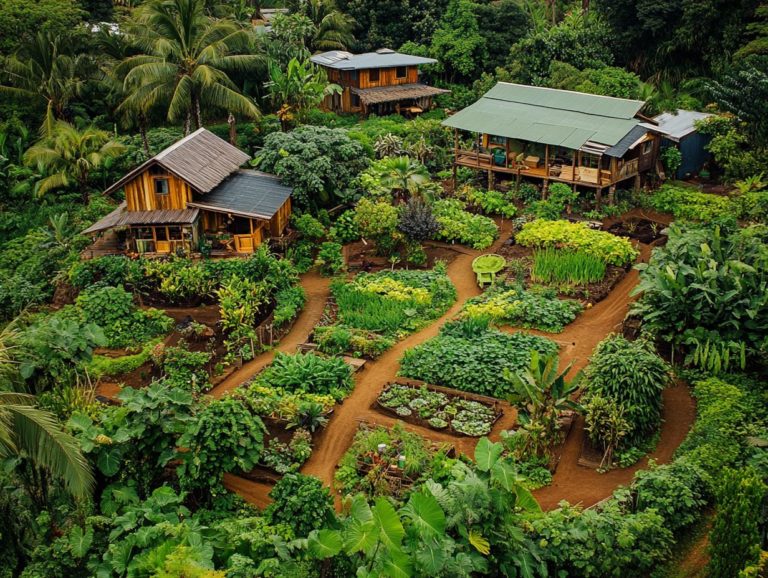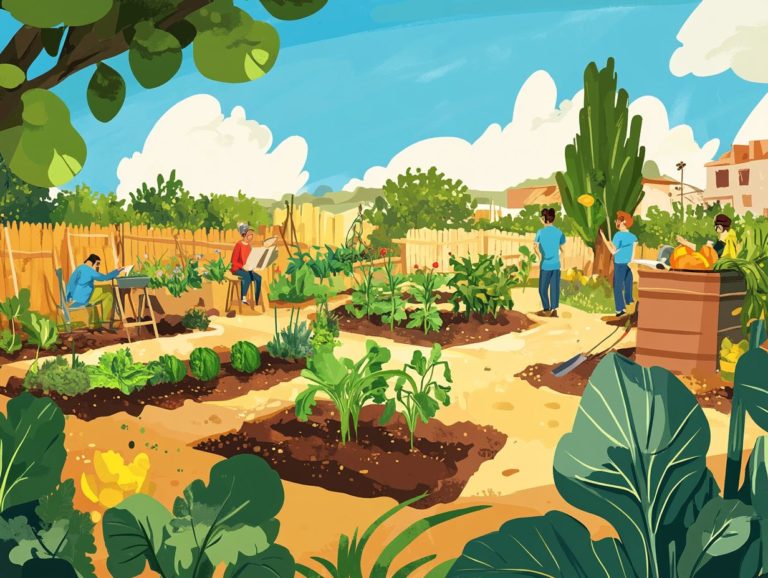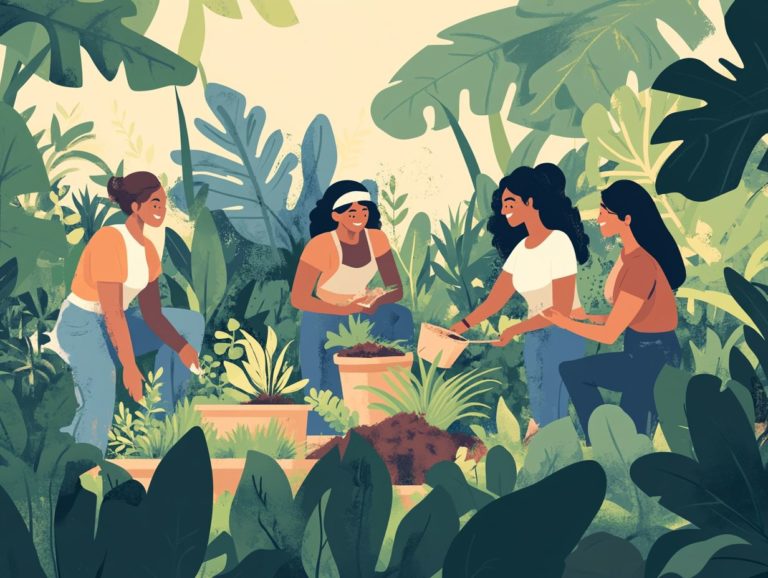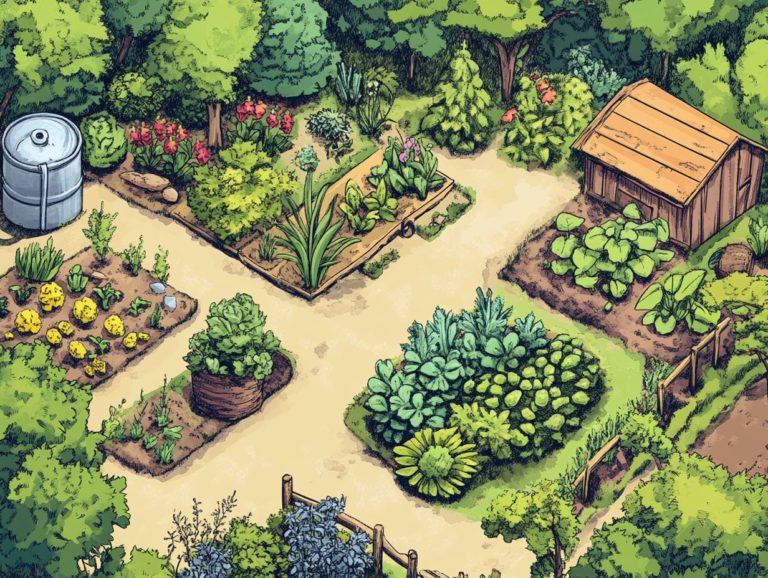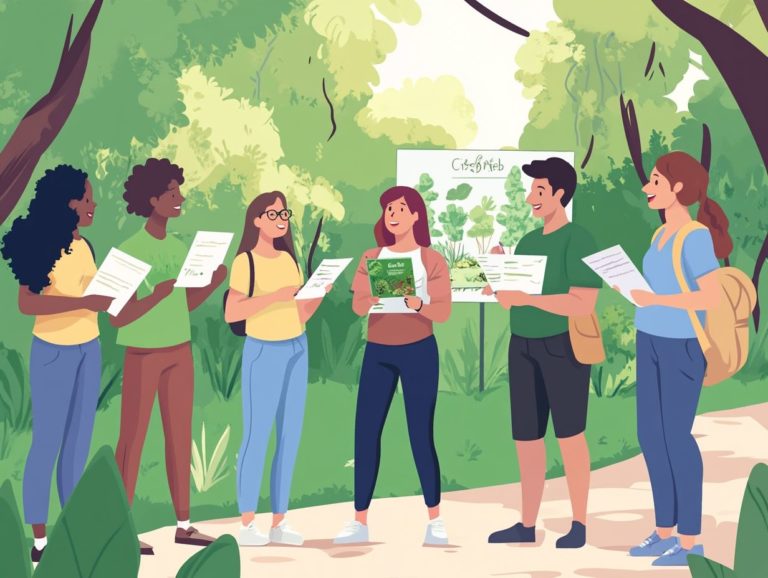12. The Impact of Community Gardens on Urban Areas
Community gardens have blossomed into vibrant green sanctuaries within urban landscapes, offering not only fresh produce but also serving as vital hubs for social interaction and environmental stewardship.
This discussion delves into the myriad benefits these gardens provide, examining their positive social and economic impacts alongside the challenges that arise when establishing them in densely populated areas.
You ll discover successful case studies that showcase how community gardens can effectively tackle pressing urban issues. Join us in discovering how these gardens are revolutionizing urban life!
Contents
- Key Takeaways:
- Benefits of Community Gardens
- Challenges in Implementing Community Gardens in Urban Areas
- Successful Examples of Community Gardens in Urban Areas
- Transforming Urban Areas with Community Gardens
- How Community Gardens Can Improve Urban Areas
- Frequently Asked Questions
- What are community gardens and how do they impact urban areas?
- How do community gardens improve mental and physical health in urban areas?
- Do community gardens really increase social connections in urban areas?
- How do community gardens promote environmental sustainability in urban areas?
- Do community gardens have a positive impact on property values in urban areas?
- How can I get involved in community gardens in my urban area?
Key Takeaways:
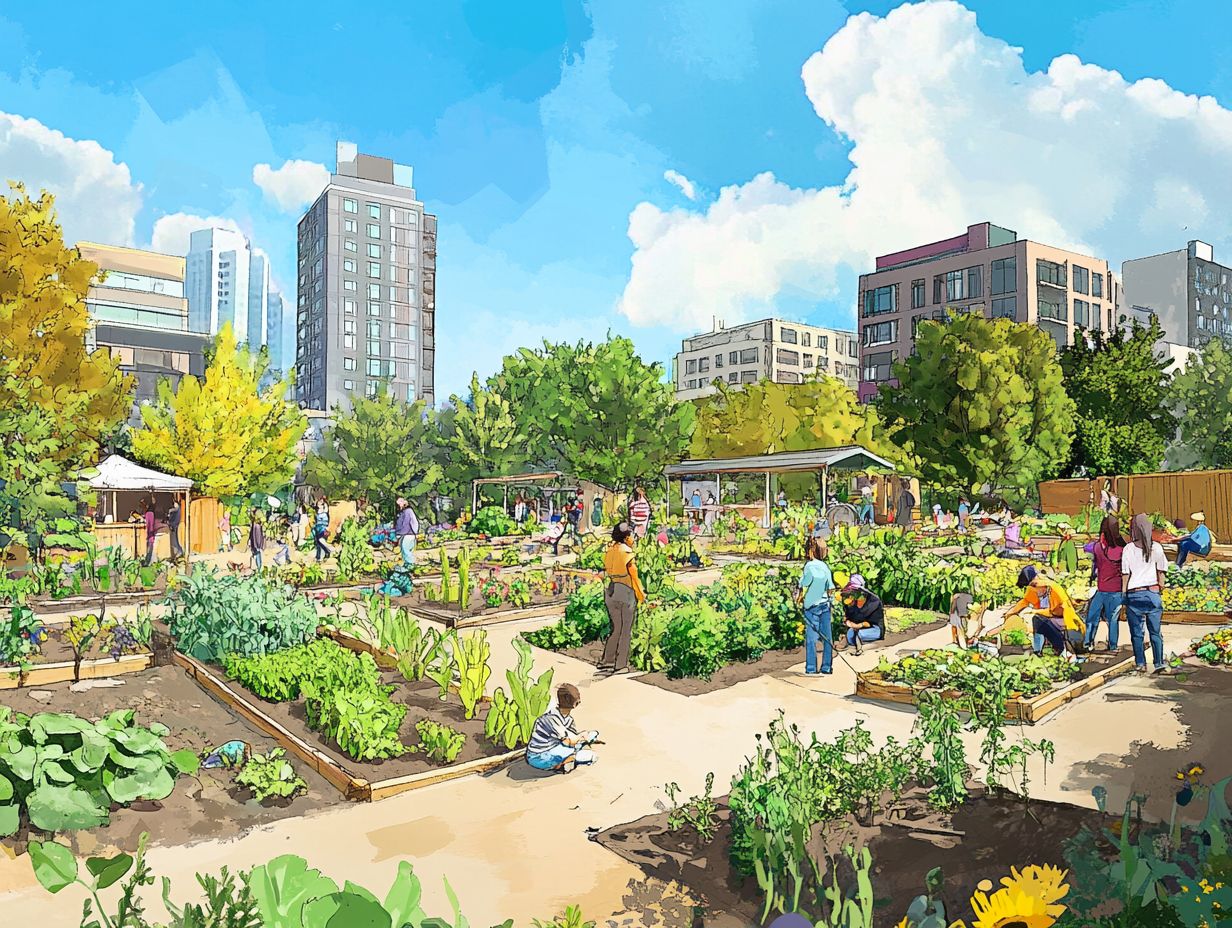
- Community gardens provide numerous social and environmental benefits to urban areas, such as promoting community bonding and improving air quality.
- Despite facing challenges like limited land availability and community engagement, successful examples of community gardens in urban areas offer valuable lessons for potential solutions to urban issues.
- Implementing community gardens in urban areas can lead to economic benefits, such as creating job opportunities and increasing property values, making it a win-win situation for both the community and the city.
Defining Community Gardens and Their Purpose
Community gardens represent a vital intersection of urban greening and community gardening. They enhance urban environments while nurturing a strong community spirit.
In these collaborative spaces, you re not just cultivating plants; you re also cultivating social bonds and a genuine sense of belonging.
By transforming vacant lots into vibrant gardens, you can tackle pressing issues like food security and environmental health, all while promoting health initiatives that boost participation in gardening activities.
Food security means having reliable access to enough affordable, nutritious food. These initiatives are essential, especially as urbanization encroaches on green spaces, ultimately influencing your quality of life and emotional well-being.
Throughout history, community gardens have taken on various forms, evolving into critical resources in urban settings. They aim to mitigate challenges such as social isolation and limited access to fresh produce.
Their objectives go beyond mere cultivation; they are about fostering community cohesion, creating educational opportunities, and inviting recreational activities.
Residents often find solace in these green spaces, leading to significant stress reduction and enhanced mental health.
The psychological benefits of connecting with nature are well-documented. In these gardens, you can find an oasis amidst urban chaos, a place to unwind, share experiences, and develop a renewed appreciation for your environment.
Ultimately, community gardens contribute to resilience, transforming neighborhoods into friendly, interconnected spaces that thrive on collaboration and shared aspirations.
Benefits of Community Gardens
Community gardens present a wealth of advantages that extend far beyond the realm of gardening, playing a crucial role in enhancing psychological health and resilience within urban settings.
These gardening programs cultivate social interaction, enrich personal green spaces, and ultimately foster community development by creating shared areas that invite participation.
Qualitative studies have demonstrated that individuals involved in gardening activities frequently experience notable improvements in mental health, including reduced stress levels and increased self-esteem. This makes such initiatives vital for the overall well-being of the community. They also enhance community cohesion.
Get involved in your local community garden today and experience the benefits firsthand!
Social and Environmental Impacts
Community gardening offers amazing social and environmental benefits. It helps bond neighbors and beautifies cities. As you nurture these urban gardens, you contribute to improved environmental health by increasing greenery in your neighborhood and restoring vital ecological connections within urban settings. This addresses the challenges brought on by urbanization while creating a space for social interaction, allowing you to connect with nature and your neighbors.
Research shows that these gardens lower temperatures in cities, creating a cool oasis for nearby homes. For example, in Philadelphia, community gardens have been linked to an average 9% rise in property values within a 1,000-foot radius, highlighting their positive influence on local economies.
In cities like Detroit, community gardens have increased access to fresh produce by 20% for participating families. This shows just how powerful these gardens can be for food security. The synergy of ecological benefits and social engagement underscores the transformative potential of community gardens, positioning them as essential resources for urban residents like you who seek both health and connection.
Economic Benefits
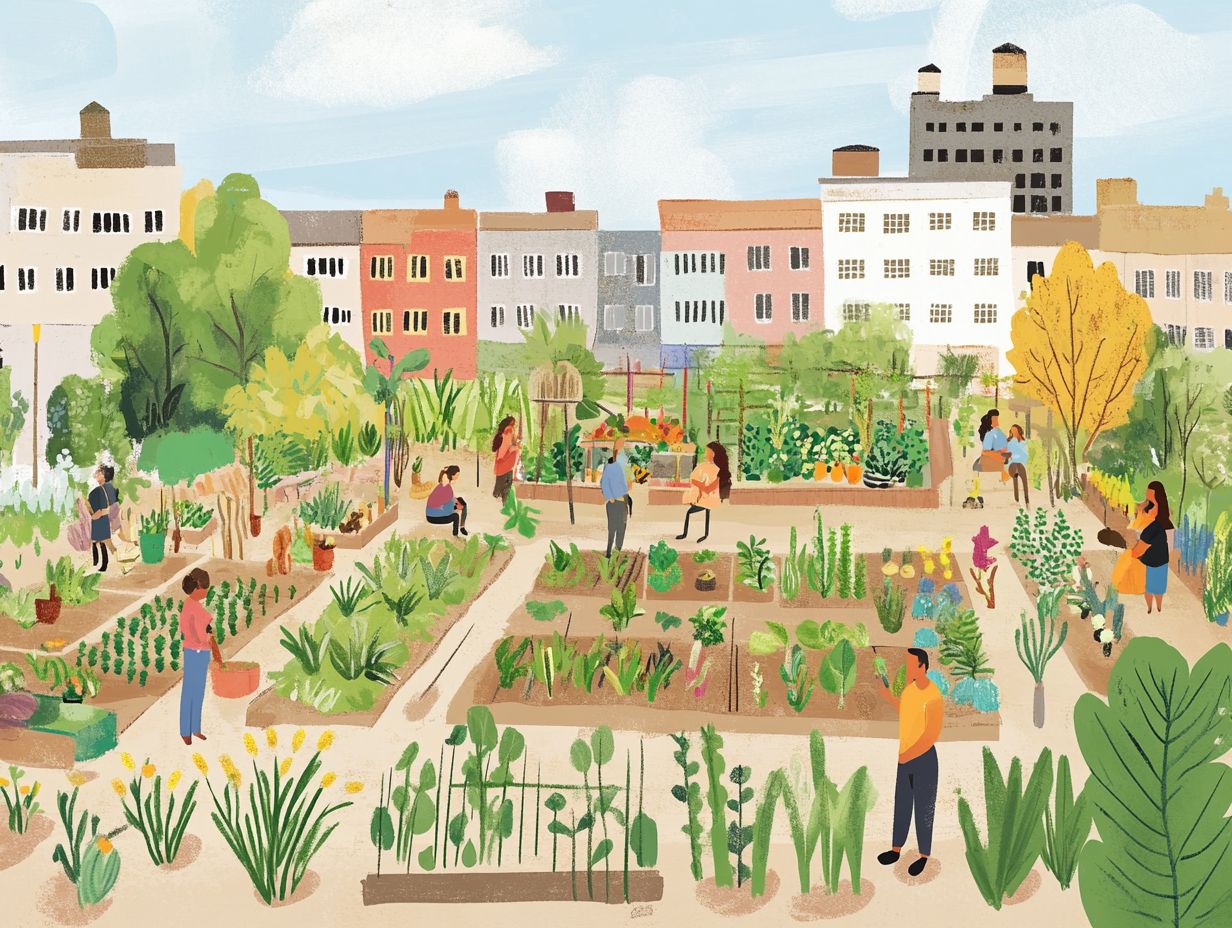
Community gardens boost local economies by reducing food deserts and providing fresh produce. They also help cut grocery bills for families. These gardening programs foster community engagement and stimulate local jobs and economies, creating a sustainable model for health promotion and economic growth.
When you cultivate your own food, you’re also opening the door to entrepreneurship and local business development. Surplus produce can be sold at farmers’ markets or through local grocers, providing an additional income stream. Consider the successful community garden in Detroit that has transformed vacant lots into thriving farming hubs, generating income for local families and sparking economic activity in the area.
These gardens often act as educational platforms, teaching individuals about nutrition and sustainable practices, which leads to healthier communities. The interactions among residents build social capital, resulting in partnerships that strengthen local food networks and deepen community bonds.
Challenges in Implementing Community Gardens in Urban Areas
Implementing community gardens in urban areas presents unique challenges that you must navigate to ensure both sustainability and effectiveness.
Securing land for community gardens can be tough due to competition for public spaces. Active resident participation is also key to their success. Addressing concerns related to food deserts within these urban settings is equally crucial for creating a thriving gardening initiative.
Get involved in local gardening initiatives and appreciate the benefits of community gardens!
Land Availability and Access
Land availability and access are important factors influencing your ability to establish community gardens in urban settings. They often determine whether gardening activities can even take root.
In densely populated areas, suitable public spaces for community gardening are frequently in short supply. This leads to competition among various community initiatives. Limited land availability can obstruct the creation of community gardens and their long-term sustainability.
It becomes essential for local governments and organizations to champion policies that enhance access to these vital green spaces. As urban environments continue to evolve, innovative solutions are emerging to tackle these land scarcity challenges.
For example, some community-led initiatives have successfully transformed vacant lots into vibrant gardens, showing how amazing it can be to repurpose spaces. Projects like these not only provide fresh produce while building community connections but also nurture environmental awareness.
Collaborations with local businesses and schools have proven advantageous. These partnerships create inclusive spaces where residents can share resources and knowledge. They exemplify how effective community strategies can breathe new life into urban settings, turning overlooked areas into flourishing public spaces.
Community Engagement and Support
Community engagement and support are vital for the success of community gardens. They act as the backbone for establishing strong connections between people within urban landscapes.
Effective gardening programs thrive on your active participation and collaboration with fellow residents, alongside the backing of local organizations and stakeholders.
By fostering a sense of community through organized activities and events, you encourage social support. This prompts residents to invest their time and resources into their gardens, ensuring both longevity and impact.
When you and your neighbors come together for planting days, workshops, or harvest celebrations, you not only acquire valuable gardening skills but also cultivate friendships and lasting connections.
Programs that incorporate regular volunteer opportunities like garden maintenance or educational sessions can significantly strengthen these bonds. Integrating local schools into gardening initiatives creates a dynamic environment where children learn about sustainability while elderly community members share their wisdom.
Such strategies enhance engagement and cultivate a shared sense of stewardship. They lead to gardens that flourish in both produce and community spirit. These initiatives promote connection to nature and contribute to the overall emotional well-being of participants.
Join your local garden initiative today!
Successful Examples of Community Gardens in Urban Areas
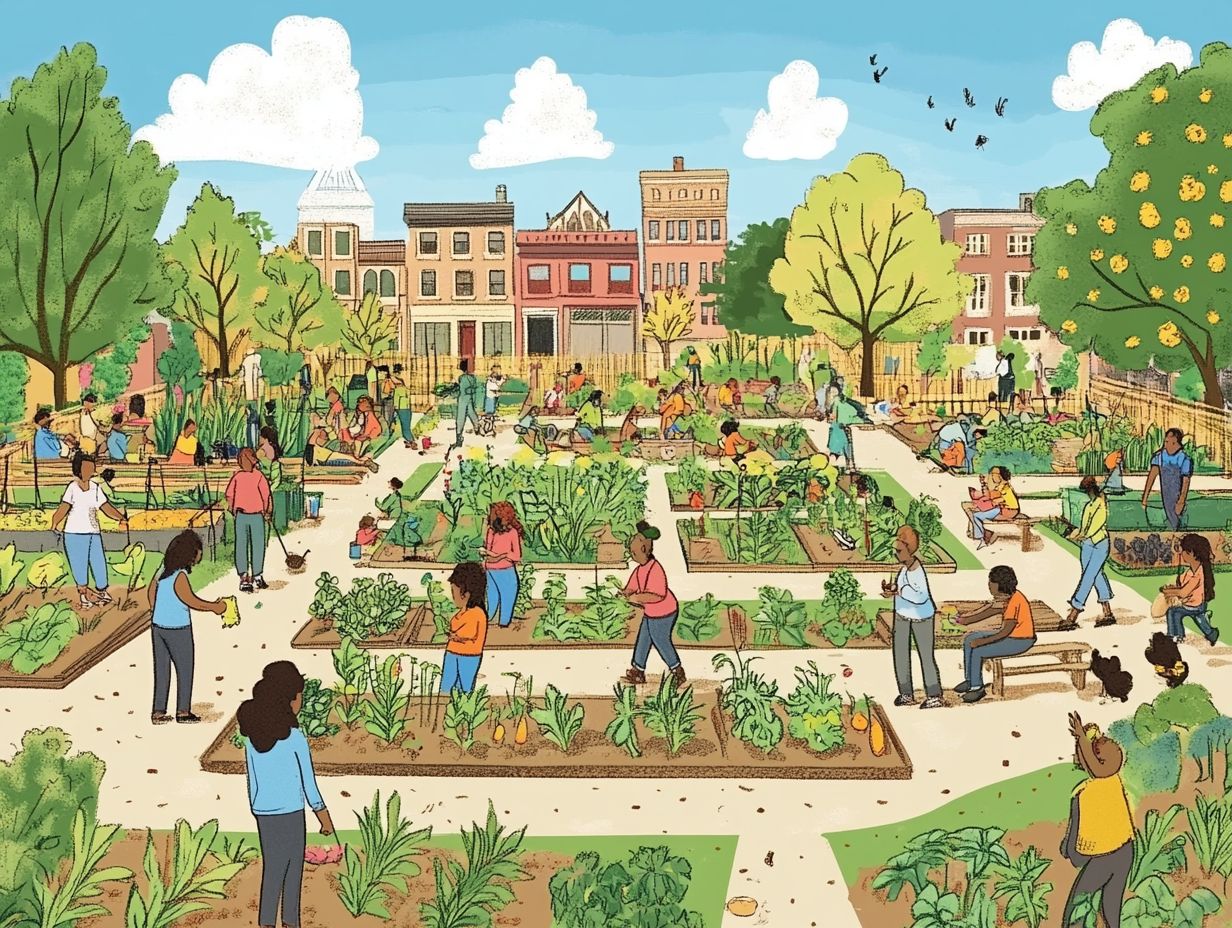
Successful examples of community gardens in urban areas exemplify the transformative power of community gardening. They inspire other initiatives aimed at enhancing urban environments, especially concerning urbanization and community development.
Notable case studies, such as those from Community in Bloom initiatives, illustrate how urban gardens can elevate neighborhood aesthetics while fostering community spirit and resilience. These projects enhance social support within neighborhoods.
They underscore the significance of collective efforts in overcoming challenges and achieving sustainable growth in the gardening narrative of urban landscapes. This reflects the importance of resilience and emotional experiences in community settings.
Transforming Urban Areas with Community Gardens
Case Studies and Lessons Learned
Case studies of community gardens provide valuable insights into their implementation and the mental health benefits they can offer. These examples showcase how urban gardening initiatives can enhance community connections while improving individual well-being through social gardening activities.
Each unique case offers important lessons for future gardening programs. For example, a neighborhood garden transformed into a lively hub, fostering connections among diverse age groups. Participants reported feeling a greater sense of belonging and experiencing reduced anxiety by collaborating on gardening tasks, contributing to their stress relief.
However, challenges like resource allocation and volunteer burnout emerged, highlighting the need for ongoing support and a solid structure to maintain high participation rates and effective health initiatives. Establishing clear roles, responsibilities, and regular community events can amplify the benefits of urban gardens, making them vital for stress reduction and emotional well-being.
How Community Gardens Can Improve Urban Areas
Community gardens are game-changers for urban areas, delivering benefits that meet both individual and community needs. These green spaces enhance better surroundings and act as essential hubs for health promotion and stress relief.
By nurturing a strong sense of community and belonging, these gardens reshape urban areas into vibrant, livable environments, fostering social cohesion and resilience.
Potential Solutions to Urban Issues
Community gardening often reveals practical solutions to urban challenges, enhancing food security and health, especially in food deserts with limited access to nutritious foods. Urban gardens provide fresh produce while improving ecological connections through increased greenery and biodiversity, which refers to the variety of life in a given area.
In cities like Detroit and Brooklyn, gardening projects have successfully transformed vacant lots into thriving green spaces, improving access to nutritious foods and fostering community development. These gardens serve as educational hubs, teaching healthy eating and sustainable practices, promoting bonding among neighbors.
By participating in gardening activities, you ll boost your physical activity and mental health, leading to better overall well-being. These efforts demonstrate how community gardens can tackle urban health issues while fostering a sense of belonging and connection.
Frequently Asked Questions
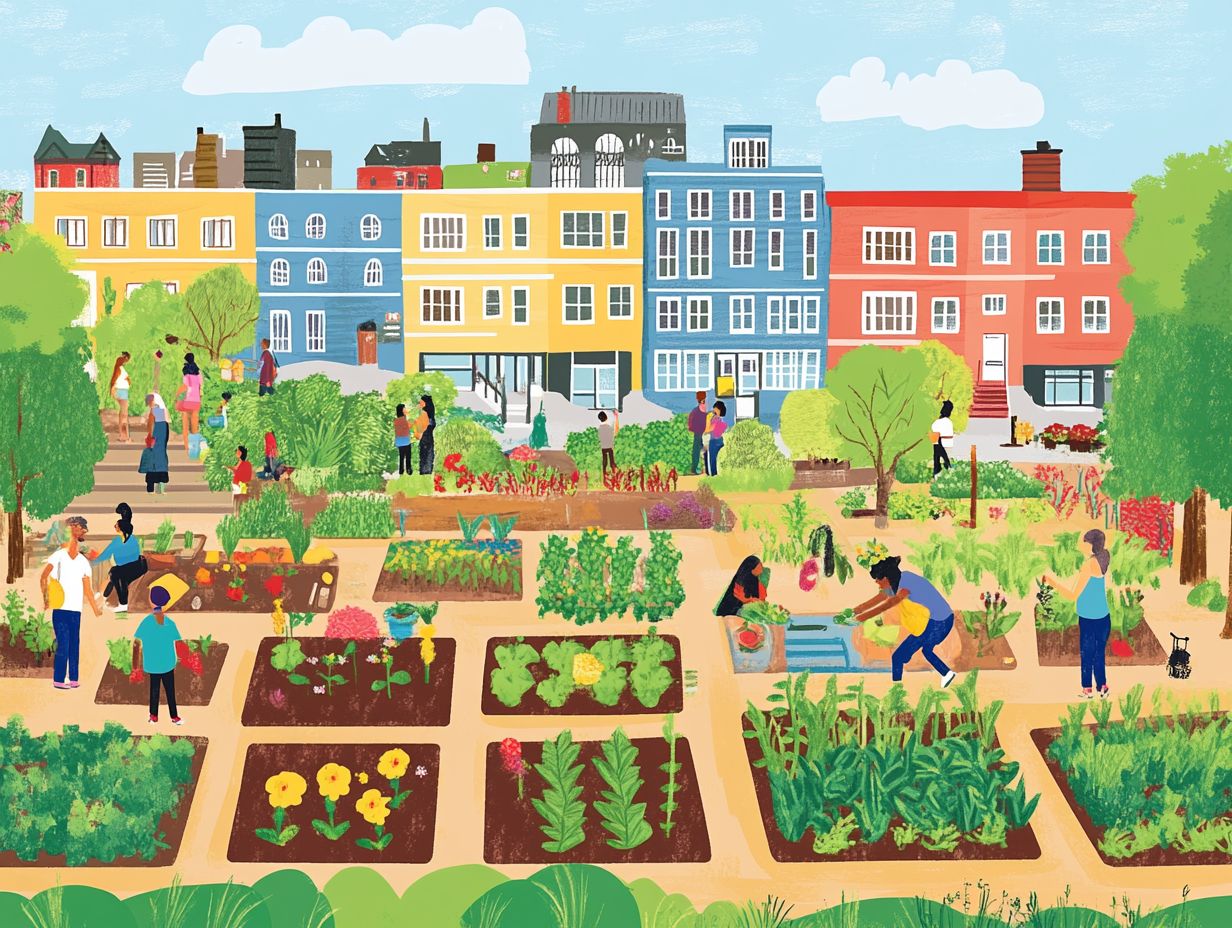
What are community gardens and how do they impact urban areas?
Community gardens are shared, communal spaces where individuals and groups can come together to grow fruits, vegetables, and flowers. They serve as vital public spaces that enhance social interaction and participation rates.
These gardens provide numerous benefits such as improved mental and physical health, increased social connections, and environmental sustainability. They significantly contribute to the well-being of the community.
How do community gardens improve mental and physical health in urban areas?
Studies show that participating in community gardens helps reduce stress and anxiety. This improvement in mental health boosts mood and overall well-being.
Access to fresh, locally-grown produce improves nutrition and helps prevent chronic diseases, contributing to health promotion and food security within the community.
Yes, community gardens foster a sense of community and belonging among participants. This reinforces emotional well-being and social support.
People from diverse backgrounds come together to work towards a common goal, leading to more social interactions, friendships, and a sense of connection. This enhances community cohesion.
How do community gardens promote environmental sustainability in urban areas?
Community gardens help reduce the carbon footprint of food production and distribution by promoting local, sustainable agriculture. This contributes to environmental health and ecological connection in urban settings.
They also combat food waste by utilizing unused land and turning it into productive green spaces, enhancing neighborhood greenery and improving health outcomes for the community.
Do community gardens have a positive impact on property values in urban areas?
Studies reveal that community gardens can dramatically boost property values in urban areas. By exploring the role of community gardens, we see how they support community development and enhance the overall quality of urban environments.
These gardens beautify neighborhoods, making them more attractive to potential buyers and increasing property values in surrounding areas. They also enhance social interaction and community spirit.
How can I get involved in community gardens in my urban area?
There are several ways to get involved in community gardens. You can participate in gardening therapy sessions or engage in local ecological restoration projects.
Join an existing garden, start a new one in your neighborhood, or volunteer at a local garden. Reach out to your city or community organization to learn more about community garden opportunities in your area, including programs that focus on resilience and health promotion.
Join a community garden today to reap the rewards of fresh food and friendship!


